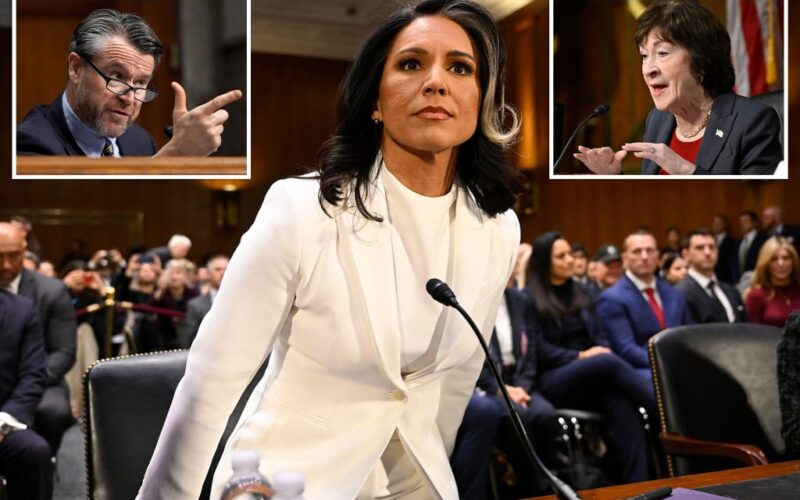Tulsi Gabbard’s nomination for director of national intelligence advanced out of the Senate Intelligence Committee Tuesday, teeing her up for a final vote later this month.
The panel met in secret, but lawmakers who emerged indicated that the vote to report Gabbard’s nomination favorably had fallen along party lines, with nine Republicans supporting the ex-Democratic congresswoman and eight Democrats opposing.
Gabbard, 43, can only afford to lose three GOP votes in the full Senate before her nomination fails.
Some Republicans and national security hawks have raised alarms about the Hawaiian’s past skepticism of the intelligence community — most notably its reporting that Syrian dictator Bashar al-Assad carried out dozens of chemical weapons attacks against his own people during the decade-long civil war in the Middle Eastern country.
During the open portion of Gabbard’s confirmation hearing last week, a handful of Republicans grilled her over her earlier stances and signaled they had deep reservations about her nomination.
Sen. Todd Young (R-Ind.) told the nominee at one point that “it would befit you and be helpful for the way you’re perceived by members of the Intelligence Committee” to acknowledge that National Security Agency leaker Edward Snowden harmed national security.
Gabbard, a past supporter of Snowden, refused to call the ex-contractor a “traitor,” but did say she would not push for a pardon and acknowledged he had broken the law by sharing details of the NSA’s warrantless surveillance program.
Young announced Tuesday that he would back Gabbard after revealing that she gave him assurances “that our intelligence professionals will be supported and policymakers will receive unbiased information under her leadership.”
Sen. Susan Collins (R-Maine), another potential swing vote, also came out in favor of Gabbard, praising her plans to slim down the Office of the Director of National Intelligence.
Sen. James Lanford (R-Okla.), who also appeared to have concerns about Gabbard, announced Monday that he would support the nomination.
Nearly all the Democrats on the panel besides Sen. Ron Wyden (D-Ore.), a staunch privacy advocate, voiced skepticism about Gabbard during the hearing.
The nominee used her time to explain her about face on issues such as Foreign Intelligence Surveillance Act Section 702, which authorizes the government to conduct surveillance on non-US citizens abroad.
“The national security capability that is provided by Section 702 that enables this foreign surveillance on non-US persons overseas is critical, period,” said Gabbard, who had previously voiced concerns about the authority and had sponsored bills to repeal it while in Congress.
Gabbard also claimed that during her now-notorious 2017 meeting with Assad, she pressed him “about his own regime’s actions, the use of chemical weapons, and the brutal tactics that were being used against his own people.”
Senate Intelligence Committee Chairman Tom Cotton (R-Ark.), generally seen as more hawkish on foreign policy, stressed that Gabbard’s FBI background check revealed she was “clean as a whistle.”
Gabbard had been a Democrat until 2022 and recently changed her party affiliation to Republican last year while endorsing President Trump.
“For too long, faulty, inadequate, or weaponized intelligence has led to costly failures and the undermining of our national security,” Gabbard said during her hearing. “The most obvious example of one of these failures is our invasion of Iraq based upon a total fabrication or complete failure of intelligence.”
“President Trump’s reelection is a clear mandate from the American people to break this cycle of failure, end the weaponization/politicization of the [intelligence communty], and begin to restore trust in those who have been charged with the critical task of securing our nation.”








